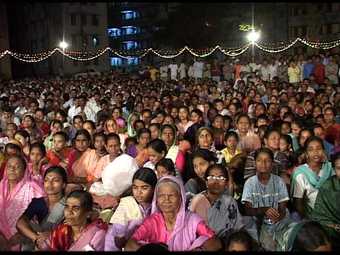Jai Bhim Comrade
India 2012, video, 180 min, Hindi, English subtitles
Although Jai Bhim Comrade is not translated into English, it is possible to approximate a translation. ‘Jai’ translates as ‘Victory’, as a cry of Victory to the liberation struggles of the Dalits. ‘Bhim’ is the affectionate abbreviation of Bhimrao, the first name of Dr Bhimrao Ambedkar, the Dalit lawyer who was Chair of the Drafting Committee of the Constitution of India and who encouraged Dalits to convert to Buddhism and reject the Hindu caste system that condemned them to social death. ‘Comrade’ stands for Vilas Ghogre, the Dalit Marxist whose suicide triggered the film. The term ‘Comrade’ evokes solidarity but also alludes to the tensions between Ghogre and his the Communist Party, between Ambedkar and the Congress Party and the Dalit movement’s unresolved argument with Communism. Each word in the title alludes to longstanding debates over the legacy of Ambedkar. Every one in the film is struggling over this political and religious inheritance that takes on an aesthetic dimension. The statue of Ambedkar that was desecrated with a garland of shoes, the portrait of Ambedkar on a wall in a humble Dalit room, the fundamentalist Narendra Modi seen draping a garland around a golden statue of Ambedkar, the advertising hoarding with the face Ambedkar opposite the face of the sociopath Bal Thackeray of Shiv Sena, Sheetal Sathe of the Dalit cultural group Kabir Kala Manch, demanding ‘O Bhim come out from that statue’: each of these indicates the use and abuse of history in the present. Jai Bhim Comrade does not only narrate these debates into a complex montage, important though that is. In showing the different groups of ex-Dalit Panthers, Communists, Hindu fundamentalists and young radicals all fighting over the political symbolism of Ambedkar, it intervenes in support of a future India that has annihilated caste, a direction that is spelt out by Sheetal Sathe who sings the last words of the film.
Curated by The Otolith Collective. Followed by response and audience discussion with Anand Patwardhan, Kodwo Eshun and Anjalika Sagar.
- Download the programme notes [PDF, 5.8MB]

